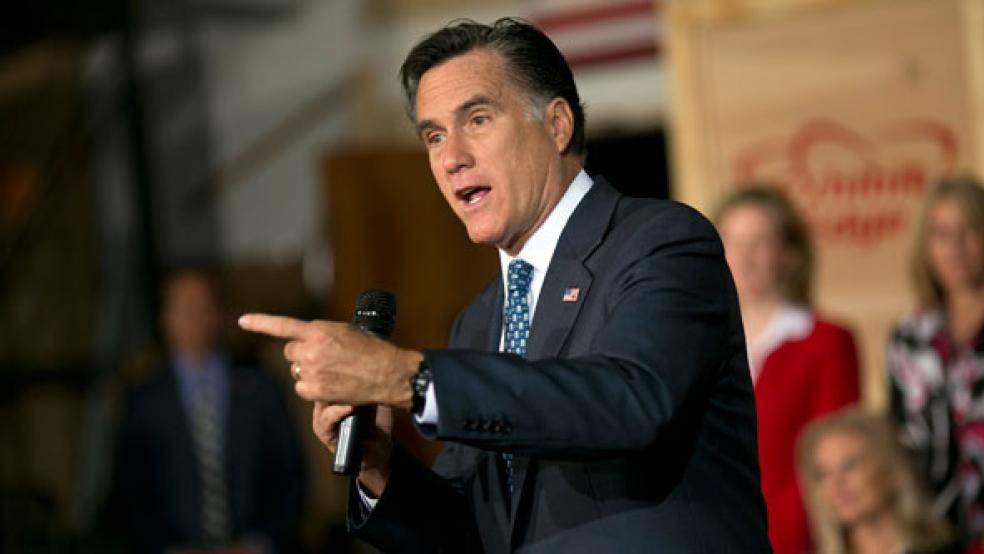Democrats pounced again when Mitt Romney on Friday offered some entrepreneurial advice to students at a campaign stop at Otterbein University in Westerville, Ohio.
"We've always encouraged young people: Take a shot, go for it. Take a risk, get the education, borrow money if you have to from your parents, start a business," Romney told the crowd at his “guest lecture” before transitioning into the story of Jimmy John Liautaud, who started his Jimmy John’s Gourmet Sandwiches chain in 1983 with the help of a $20,000 loan from his father (in exchange for a 48 percent stake in the business). "This is kind of an American experience," said Romney.
Dems spun it as yet another example of the presumptive GOP nominee being out of touch – how many parents have a spare $20,000 lying around? “Only someone who paid for college by selling stock given to him by his CEO father would just casually assume students could go borrow $20,000 from their parents to deal with the economic challenges they face,” Joshua Dorner, a spokesman for the Center for American Progress Action Fund, told the Associated Press. And there were jabs about the $10 million Romney and his wife invested in their son Tagg’s private equity startup.
The larger issue with Romney’s suggestion may be that it doesn’t fully jibe with the real-world profile of entrepreneurs. “The common perception is that entrepreneurship is essentially something that is just for young folks,” says E.J. Reedy, a researcher with the Kauffman Foundation, which studies and promotes entrepreneurship. That perception may be fueled by the popular success stories of youngsters like Mark Zuckerberg or Bill Gates. The reality of entrepreneurship in America is quite different. “The much more typical case would be for somebody to be in their 40s, to have 10-plus years of industry experience before they’re starting a business,” Reedy says. In fact, the median age of first-time entrepreneurs is 43, according to the Kauffman Foundation. Even in the tech world, the average age of entrepreneurs is 39, which sounds almost ancient compared to college dropouts like Zuckerberg, Gates and Michael Dell.
Aspiring businesspeople between the ages of 20 and 34 still make up the largest share of entrepreneurs, primarily because of the sheer size of the population in that age group. Yet the share of young people who start a business has stayed relatively flat over the last 15 years, at just under 0.3 percent.
Just 4 percent of people ages 16 to 29 are self-employed, compared to 15 percent of people between 50 and 64 and a quarter of those over 65, according to a 2009 Pew Research Center analysis of Census data. Looking at the propensity of young people to start their own businesses, Reedy notes, “you find that the youngest age group consistently over time is the least likely to enter into entrepreneurship.”
Access to capital is obviously more of an obstacle for young entrepreneurs than older ones, but lack of work experience is also a deterrent, as economist Scott Shane of Case Western Reserve University has noted.
Those issues, on top of inexorable demographic trends, help explain why young people now account for a smaller share of new startups than in the past: Less than 30 percent of new entrepreneurs in 2011 were between the ages of 20 and 34, compared with about 35 percent in 1996. By contrast, nearly half of new entrepreneurs last year (48.6 percent) were between the ages of 45 and 64, up from 38.2 percent in 1996. Those at the higher end of that range, between 55 and 64, have grown from 14.3 percent to about 21 percent of new entrepreneurs. “An aging population and increasing rate of entrepreneurship among older ages has led to a rising share of new entrepreneurs in the age 55–64 group,” writes economist Robert Fairlie of the University of California, Santa Cruz in a Kauffman report released in March.
That means young people looking to borrow $20,000 from their parents might find that they get turned down because the grown-ups are already using the money to start a business of their own.





